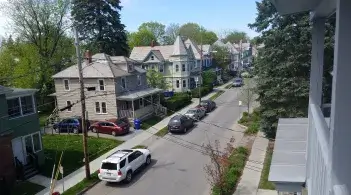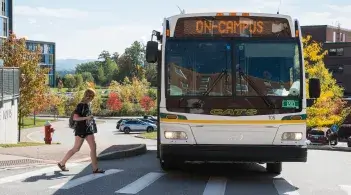Getting ready to move off campus? Already living in an apartment, but looking for some support in solving a problem? Look no further! Read on for more information about finding an apartment and living well off campus.
We hope that this guide will serve as a resource for you during your time as a Burlington resident and that it helps you build the skills and knowledge to be a good renter, roommate, neighbor, and community member. Download our complete Off-Campus Living Guide (PDF).
Additional Resources from Campus Partners
Finding an Apartment that Meets Your Needs
Finding Your Place
When Do I Look for a Place – and Where?
Generally, we recommend beginning your search for an apartment 6-8 months in advance of your desired lease start date. Most leases in Burlington will run from June to the end of May, and some of the most desirable units are rented almost a year in advance. Word of mouth is a great way to start looking for a new place. Of course, beware of online scams and never share personal information online.
Finding and Choosing Your Roommates
Choosing compatible roommates is essential to a successful off-campus experience. If you are looking for a roommate, word of mouth can be a great place to start. UVM’s Off-Campus Housing Database also has a section of their website devoted to connecting UVM affiliates who are looking for roommates. Contact the Office of Student and Community Relations for additional resources related to finding and choosing roommates.
Vermont Tenants, a statewide renter advocacy group, has a sample roommate agreement (PDF). This is a good resource for deciding how you divide up your rental costs, chores, and for setting expectations about guests, pets, smoking, socializing; etc.
As you select your roommates, keep in mind that there is an ordinance in Burlington that prohibits more than four unrelated individuals living in a single residence. Though some properties have been “grandfathered” in and are allowed to have more than four unrelated tenants in a single unit, take this into consideration as you decide how many people you want to live with and as you view properties. Keep in mind that allowing individuals whose names are not on the lease to live in your apartment is illegal and may result in eviction. Consult Chapter 5 for more information about the “Four-Unrelated” Ordinance.
Before You Sign the Lease
Before you rent, make sure you know the following:
- Is a co-signer required on the lease? (Co-signers can be parents, guardians or someone else in your life willing to take on financial responsibility for you. For international students contact OIE for assistance.)
- What are the exact move-in and –out dates?
- Who will pay for electricity, heat, snow removal, water, trash, etc.?
- Are the security deposit and first month’s rent required when signing the lease? How will it be returned?
- (Note: In Burlington, security deposits cannot exceed one month’s rent)
- When is rent due? What is the preferred method of payment? Are fees charged for late payments?
- What parts of the common areas or yard are the tenants responsible for maintaining and where is the equipment to maintain those areas?
- What is the policy on keeping pets and having pets visit?
- Is there on- or off-street parking available? If off-street, how many parking spaces come with the unit? Are parking spaces assigned? If on-street, is a resident permit required?
- What is the process for getting your full security deposit returned?
- How will the landlord provide you with the 48 hour notice to enter your rental?
- What are the restrictions on alterations, such as hanging pictures with nails or painting the apartment?
- Are there any restrictions on smoking or any other conduct that are specific to the property?
- Does the landlord allow subleasing? If so, what are the policies and procedures for subletting? Check out a sublease template at uvm.edu/oscr.
- What circumstances allow for lease termination?
- How is trash, recycling, and compost handled?
Rent and Utilities
- The cost of rent will vary depending upon the number of bedrooms, whether or not utilities are included, recent renovations, and location. Be sure to ask about what is and is not included in the monthly rent, like: heat, hot water, trash/compost removal, snow removal, electricity, laundry, internet, off-street parking, city water, and sewer.
- Ask your prospective landlord what the average cost of utilities for the apartment is, as this is an important factor in determining your projected monthly expenses. You can also call the utility companies directly for the usage history at the rental unit address.
For questions regarding how your financial aid will work once you move off-campus, visit UVM Student Financial Services.
Safety Check
Safety should be a priority when you search for off-campus housing. When choosing an apartment, consider the following:
- Check for obvious damage, bugs, rodents, and electrical or plumbing problems. Look at the parking area and trash facilities to see if they are adequate for your household. Talking to the current tenants could also provide useful information about the neighborhood before you move in.
- Ask if the landlord will do a “lock core change” on exterior doors. This is cheaper than changing the locks, but will ensure that any duplicate keys made by past tenants will no longer work.
Specific Areas to Check
- Are trees and shrubs trimmed so a person cannot conceal themselves and views from windows and doors aren’t blocked?
- Is the house well lit? Are all entry/exit points fully illuminated? If your rental is in a complex, is emergency lighting provided?
- Are the common areas adequately lit? Are these areas well maintained? Is the exterior house number visible from the street (for 911 calls)?
- Are all exterior doors solid wood or metal construction? Are doorframes in good condition? Is there a deadbolt? Are there peepholes on the doors?
- Are screens and windows free of damage? Are there working locks on the windows? Do they stay open without need of a prop/stick?
- Are garbage or storage areas equipped with doors that lock?
- Where are fire extinguishers located and when were they last charged?
- Where are the smoke detectors and carbon monoxide detectors located on the premises, and are they fully functioning?
- When was the heating system last inspected, and is the tag up to date?
- Does the space appear to be cared for? Are stairways, railings, and balconies secure? Is the roof in good condition?
- Is the paint peeling? Beware of lead! Any rental housing built before 1978 should have a state lead paint warning poster. You can contact the Burlington Lead Program for more information.
- Is there a certificate of occupancy from the City of Burlington’s Code Enforcement Office posted in the building?
If the property is not compliant with any of the city ordinances listed above and throughout this guide, or if you feel unsafe in any way in the apartment or its surrounding area, do not sign the lease. You may want to consider calling the Code Enforcement Office to inform inspectors of any health and/or safety violations that you notice.
Signing the Lease
Follow these tips when signing your lease:
- Read the lease very carefully as it is a legally binding contract. Get VT Tenants to look it over with you if you are unsure of anything – it’s free!
- Keep copies of all documents you have signed and store them together in a secure location.
- Any changes to the lease must be made in ink. Make sure both parties have initialed and dated the changes. If it is not written down it doesn’t exist.
- Ask questions and do not sign the lease until every passage is completely clear to you.
- Check to see that the lease reflects the understandings you made with the landlord at the time you saw the apartment.
- You are not bound to provisions in the lease that are deemed illegal by state or federal law, even after signing the lease. If you are concerned with the legality of something in the lease, consult VT Tenants.
Housing Discrimination Resources
Landlords cannot refuse to show, sell, rent, sublease, or otherwise make housing unavailable based on a renter’s race, color, national origin, sex, disability, religion, familial status, marital status, gender identity, sexual orientation, or receipt of public assistance.
Landlords also cannot charge some individuals higher rent or falsely state that housing is not available for discriminatory reasons. If you believe you have been a victim of discrimination, contact one of these agencies:
Paying Your Security Deposit
Most landlords require a deposit at the time of signing the lease. This deposit covers possible property damage, unclean conditions, and unpaid rent.
In Burlington, security deposits CANNOT exceed one month’s rent and must be held in an interest bearing account. It is a good idea to take photos of the rental to document conditions when you move in and out.
Within 14 days from the date the lease ends or the tenancy terminates, the landlord is required to either return your full security deposit or give you a written list of documented expenses that account for the portion of the security deposit that was withheld.
The landlord is only obligated to send the security deposit to the tenant’s last known address, so make sure that you communicate the address you want it sent to. Give a self-addressed envelope to your landlord during your move-out inspection.
If the landlord fails to comply with the security deposit procedures listed above, the renter may file a free complaint with the City’s Housing Board of Review. For properties outside of Burlington, contact the City or Town Clerk’s office.
Setting Up Services and Establishing Residency
Utilities
Gas, Oil, Or Propane Service
Burlington area natural gas service is provided by Vermont Gas. There are numerous oil and propane vendors in the Burlington area.
Electricity
The Burlington Electric Department is the electrical utility for all of Burlington. If you live outside of Burlington, contact your local power company.
Water Service
In Burlington, water is provided by the Burlington Water Department. If you are living outside of Burlington, the provider that will serve you is dependent on the location of your residence. Your landlord can tell you which provider to contact.
Cable and Internet
There are multiple providers for cable or satellite TV as well as high-speed internet access in the Burlington area – a quick search online will connect you to a number of different options.
Energy Efficiency and Conservation
Turn off and unplug all unnecessary electronics. Utilize “sleep” settings on computers. Make sure to turn off equipment during extended periods of inactivity.
Trash, Recycling, and Compost
Trash Collection
If you live in Burlington in a single-family dwelling, you are responsible for providing and maintaining sufficient garbage facilities. The Chittenden Solid Waste District can provide a list of haulers.
For duplexes and all multi-unit dwellings, the landlord is required by law to make arrangements for trash collection. The landlord must provide properly sized storage facilities for waste and see that they are emptied on a weekly basis. The tenants are responsible for putting waste in the designated receptacle or storage area. In Burlington, you are required by ordinance to move trash receptacles off of the green belt and onto your rental property after it is picked up. If you live outside the city limits, contact private companies for trash collection.
Recycling
Recycling is required in Vermont. For more information on your neighborhood’s specific pick up time and other information in Burlington, contact the Department of Public Works (DPW).
Curbside recycling may be put out ONLY on the day assigned for pick up on your street. Outside of Burlington, contact the Chittenden Solid Waste District (CSWD) for details. For a recycling information go to cswd.net.
Note: Your household can receive uncovered blue bins free of charge at the DPW at a CSWD Drop-Off Center, check their website for locations.
Compost
Did you know? Vermont banned food scraps from landfills in 2020. Check with your landlord for the composting process and visit Chittenden Solid Waste District for all you need to know.
Tips for Conserving Energy
- Turn off and unplug all unnecessary electronics.
- Utilize “sleep” settings on computers. Make sure to turn off equipment during extended periods of inactivity.
- Use a microwave or toaster oven when preparing small portions.
- You can save 3% of your heating costs for each degree you set your thermostat back by (make sure to keep heat above 55 degrees in winter to avoid frozen pipes!).
- Take quick showers; use washing machines and dishwashers with full loads only; and use cold water when using a washing machine (it is equally effective at getting clothes clean).
- Many appliances/electronics consume electricity while they are “off”, like appliances with clocks. Save money and energy by unplugging these devices while they are not in use.
- To prevent heat loss, seal and weatherstrip doors and windows. Install plastic sheeting on the inside of all windows. Note: consult your landlord before any weatherization efforts.
- Save money by replacing light bulbs with LED bulbs. They last up to ten times longer than incandescent bulbs and use two-thirds less energy.
- To reduce the use of hot water, install low-flow shower heads and sink aerators. Note: consult your landlord before installing these items.


